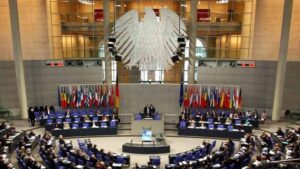
The German Armed Forces have extended to about 4 billion euros a contract with arms manufacturer Rheinmetall to make ammunition for Leopard 2 tanks, it is expected that some of this ammunition will be supplied to Ukraine, according to the Rheinmetall Group’s website.
“The Bundeswehr has extended the existing framework contract with Rheinmetall for the supply of tank ammunition worth around 4 billion euros…. The order expresses the armed forces’ desire to close the resulting stockpile gaps and increase the overall ammunition supply in view of the security situation. The framework agreement also provides for the delivery of a significant amount of tank ammunition for the Ukrainian Armed Forces,” the statement said.
It is also noted that “by the end of 2030 under the concluded framework agreement may be purchased several hundred thousand combat and training ammunition of various designs of 120 mm x 570 caliber, similar to those fired by the main gun of the Leopard-2 main battle tank.”
According to the company, the first delivery of ammunition worth about 309 million euros took place immediately after the contract was signed.
It is emphasized that for many countries that use the Leopard battle tank with 120mm smoothbore gun, Rheinmetall is the main supplier of ammunition of this caliber.

The largest private railway passenger carrier in Central Europe Czech RegioJet in partnership with Ukrzaliznytsia plans to launch in 2023 a flight Prague-Chop, and in 2024 two flights to Germany – Kiev-Berlin and Kiev-Hanover via Leipzig and Dresden, said the owner of RegioJet Radim Jančura in an interview for “Forbes Ukraine”.
“Historically, the train from Kiev to Berlin ran until 2012 and was very successful. But the German railroad at one time imposed commercial conditions that increased the cost of the train on the territory of Germany. It made the route unprofitable and the trip was closed,” – he said.
The RegioJet head said the company has optimistic expectations for this project, as many more Ukrainians travel to Germany than to the Czech Republic.
Yanchura also underlined that RegioJet has a different business model from the state operators, so UZ will not have to share the revenues with the Polish and German railroads.
Speaking about the flight to Chop, the RegioJet head noted that the company has the largest share of transportation on the popular route Prague-Kosice.
“We would like to continue this route to the Ukrainian city of Chop in Transcarpathian region, and in the future to Mukachevo,” Jančura said.
According to him, the company now agrees with “Ukrzaliznytsia” schedules and conditions, so we plan to run a new train to Chop during 2023.
Yanchura added that launching a train to Mukachevo is more difficult.
“The main obstacle is the Chop-Mukachevo track section is not electrified: it used to have a contact network, but later part of it was dismantled,” the RegioJet owner noted and added: – We are ready to electrify this section at our own expense.
The head of RegioJet did not name the cost and timing of the project. According to him, they will be known after the Ukrainian authorities and UZ will approve the technical audit and determine the scope of work.
According to him, after Ukraine joins the EU, RegioJet will be able to operate trains itself in Ukraine, having received a license.
“This is how we work in all countries of the European Union. In the EU, anyone can get access to the railway infrastructure by paying a fixed tariff,” Yanchura explained.
The RegioJet owner noted that the company relies on residents of small towns rather than the population of large cities with well-developed airports.
In addition, according to Yanchura, the company is working on the possibility of RegioJet trains, still following only to the Polish Peremyshl, to the Ukrainian border station “Mostiska-2” and plans to implement this project by the end of 2023.
“For this purpose it is necessary to complete the passenger platform and the pedestrian bridge. We are ready to build it at our own expense, “- said the owner of the company.
He also said that he is ready to buy in Ukraine passenger railway cars in large quantities, but their price should be up to $ 1 million per piece.
RegioJet is the second biggest bus carrier in Europe after Flixbus and the biggest private railway passenger carrier in Central Europe. The company has licenses to operate in the Czech Republic, Slovakia, Germany, Austria and Poland. Last year, RegioJet carried 11 million passengers.

Germany has handed Ukraine a new military aid package that includes 16 Mercedes-Benz Zetros trucks, a TRML-4D radar station for IRIS-T SLM surface-to-air missile systems and a mobile demining system, the German government’s press service said Thursday.
In total, Germany’s new military aid package for Ukraine includes: 16 Mercedes-Benz Zetros trucks, a TRML-4D radar station for IRIS-T SLM surface-to-air missile systems, one mobile and protected demining system, three Biber bridge trucks and two border security vehicles.

Some 94% of Ukrainians consider Poland a friendly country, 86% consider the United States friendly, 85% – the UK, 80% – Germany, 40% – Turkey, and 5% – China, according to a poll by the Rating sociological group in cooperation with public organization Transatlantic Dialogue Center.
At the same time, 2% of Ukrainians consider Poland a neutral country, 7% consider the United States neutral, 6% the UK, 14% Germany, 48% Turkey, and 52% China.
In addition, 1% of Ukrainians consider Poland to be an enemy country, 2% consider the United States to be an enemy, 1% – the UK, 2% – Germany, 4% – Turkey, and 34% – China.
The attitude towards Germany among Ukrainians has improved, as the percentage of assessment of its friendly country has increased from 65% last year to 80% this year.
“The attitude of Ukrainians towards China and Turkey is deteriorating in dynamics. If in October last year, China was considered rather a neutral country (63%), this assessment changed to a more neutral-negative one: 34% rated it as a hostile country, 52% as neutral. As for Turkey, its assessment as a neutral country has increased: 48% consider it neutral, 40% – friendly, while last year its assessment as a friendly country (51%) was more than neutral (39%),” the sociological group said.
The survey was conducted on June 1-2, 2023 among citizens aged 18 years and older in all regions, except for the temporarily occupied territories of Crimea and Donbas, as well as territories where there is no Ukrainian mobile communication at the time of the survey. The sample is representative in terms of age, gender, and type of settlement. The sample was 1,000 respondents. The survey method is computer-assisted telephone interviewing (CATI). The error is no more than 3.1%.

Home prices in Germany fell 6.8% in the first quarter compared with the same period last year, according to the country’s Federal Statistical Office (Destatis).
The rate of decline was the fastest since the data began tracking in 2000.
Home values fell 3.1 percent in January and March compared to the previous three months.
The most likely reasons for the decline in demand from potential home buyers are higher mortgage rates and sustained high inflation. This, in turn, causes a decline in home prices, noted in the report.
In the seven largest cities in the country (Berlin, Hamburg, Munich, Cologne, Frankfurt-am-Main, Stuttgart and Dusseldorf) in the first quarter, the cost of single or two-family homes fell by 10.4% year on year, while apartments fell in price by 6.4%.

German President Frank-Walter Steinmeier has signed a law to reduce the number of seats in the Bundestag from 736 to 630, German media reported.
“The reform aimed at reducing the number of Bundestag deputies comes into force. Steinmeier signed the relevant law,” the Zeit newspaper reported, citing the president’s office.
The newspaper recalls that earlier in March, the bill was passed by the Bundestag.
The law, in addition to reducing the number of parliamentary seats, provides for the introduction of a hard barrier of 5% to get into the Bundestag. Options, which until now allowed to get into parliament without passing this barrier are abolished.
The Bavarian state government and the Christian-Social Union Party are going to take the law to court because they believe that it violates the constitution.